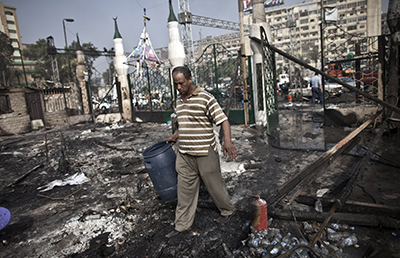New York, August 15, 2013–At least two more journalists have been reported killed and several others injured in Wednesday’s clashes between Egyptian security forces and supporters of ousted President Mohamed Morsi.
Security forces stormed pro-Morsi sit-ins at Rabaa Al-Adawiya in Cairo and Nahda Square in Giza on Wednesday using tear gas and live ammunition. More than 600 civilians were killed and almost 4,000 injured, according to the Egyptian Health Ministry. Several journalists reported being attacked, threatened, or obstructed in the violence, and cameraman Mick Deane of Sky News was killed.
The three journalists killed Wednesday bring to nine the total killed in Egypt since CPJ began keeping detailed records in 1992. Eight of them were killed since the beginning of the uprising that ousted Hosni Mubarak in 2011.
“Wednesday was the deadliest day on record for journalists in Egypt, and the threat of violence is unlikely to dissipate soon,” said CPJ’s Middle East and North Africa Coordinator Sherif Mansour. “Authorities must set a firm precedent by conducting a thorough investigation and holding those responsible to account.”
The state-run Al-Akhbar newspaper said that one of its reporters, Ahmed Abdel Gawad, was killed while covering the raid on Rabaa Al-Adawiya. News accounts reported that Gawad had been shot dead.
Gawad was also working for the organization’s TV station, Misr25, as an editorial manager, according to news outlets affiliated with the Muslim Brotherhood and Ahmed Subaie, a spokesman for the organization, who spoke to CPJ.
Mosaab al-Shami, a photographer for the local Rassd News Network, was shot in the chest by a sniper while trying to escape gunfire during the raid on Rabaa Al-Adawiya, according to the network’s director, Smahy Mustafa. The Rassd network has sharply criticized the ouster of Morsi.
Egyptian Prosecutor-General Hisham Barakat opened an investigation today into the killing of journalists, news reports said.
Several journalists were also injured in the violence. The Egyptian human rights group Association for Freedom of Thought and Expression reported 31 separate violations against local journalists, including attacks and confiscation of press equipment. CPJ documented several of these cases on Wednesday.
Tariq Abbas, an editor for Al-Watan, was shot yesterday in the face with a shotgun while covering Rabaa al-Adawiya, the newspaper reported. Alaa al-Qamhawy, a photographer for Al-Masry Al-Youm, was shot in the foot on Wednesday while covering the raid, according to news reports. He underwent surgery today.
At least two journalists remain in custody after being detained yesterday. Al-Jazeera reported today that authorities have not disclosed the whereabouts of its correspondent, Abdullah al-Shami, who was arrested on Wednesday at Rabaa al-Adawiya. An Egyptian freelance photographer, Mahmoud Abou Zeid, was detained by police and held in Cairo stadium. He has not yet been released.
International journalists have expressed their concern about tightening restrictions in the country. Freelancer Ian Lee reported on Twitter that several journalists had their photographic equipment confiscated upon arrival at the airport. At least two journalists said on Twitter that the government-run Cairo Press Center was denying and refusing to renew press credentials to international journalists. An employee of the press center who declined to give his name told CPJ that credentials were being issued, but that they take a few days to process because of “security procedures.” He did not elaborate.
International journalists operating in Egypt without press credentials are at greater risk of harassment, detention, and even violence. With the newly implemented state of emergency, press credentials would also allow journalists to pass through checkpoints after curfew.
CPJ released a special report yesterday called “On the Divide: Press Freedom at Risk in Egypt.” The report chronicles how both the Morsi administration and the current government have disappointed the high hopes for press freedom in the aftermath of the 2011 revolution that ousted Hosni Mubarak.
- For more data and analysis, visit CPJ’s Egypt page.
